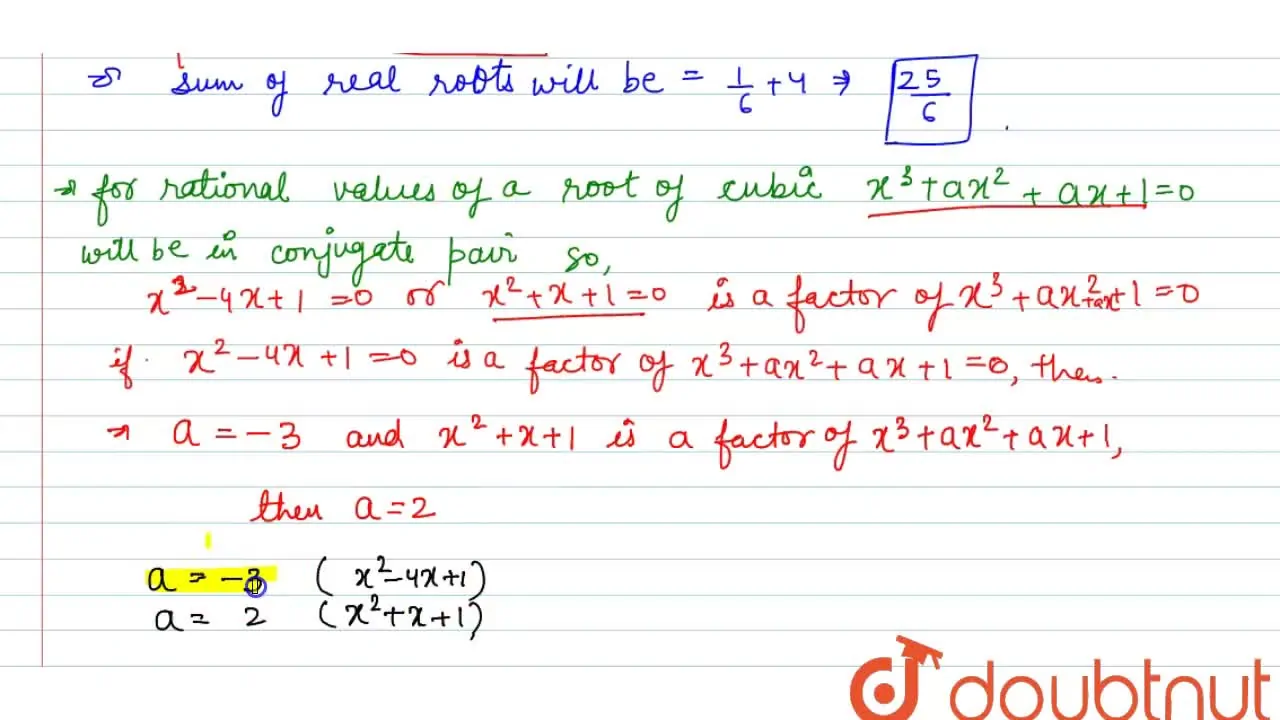All possible roots of polynomial with integral coefficients can be identified by "RATIONAL ROOT TEST" according to rational root test if a plynomial ltbr> anpn+an−1pn−1q+an−2pn−2q2+…..+a2p2qn−2+a1pqn−1+a0qn=0
Every term in above equation except possible the last one is divisible by p hence p should also divide a0qn, since q and p are relatively prime p must divide a0. Similarly q also divides an. Now consider an equation 6x5−19x4−9x3−16x2+9x−1=0 and answer the following questions
Q. if given equation and equation x3+ax2+ax+1=0 have two roots common then possible value(s) of is/are?
0
−2
−3
3
The correct Answer is:D
(13 to 14)
6x5−19x4−9x3−16x2+9x−1=0
rational roots of equation x=±1,±12,±12,±16 are possible
x=16 satisfies the equation
6x5−x4−18x4+3x3−12x3+2x2−18x2+3x+6x−1=0
(6x−1)(x4−3x3−2x2−3x+1)=0
x4−3x3−2x2−3x+1)=0
x4−3x3−2x2−3x+1=0
x2+1x2−3(x+1x)−2=0
(x+1x)2−3(x+1x)−4=0
t2−3t−4=0
(t−4)(t+1)=0
x+1x=4 or x+1x+1=0
x2−4x+1=0 x2+x+1=0
sum of real roots will be 4+16=256
for rational values of a roots of cubic x2+ax2+ax+1=0 will be in conjugate pair so either
x2−4x+1=0 or x2+x+1=0 is a factor of x3+ax2+1=0
if x2−4x+1=0 is a factor of x3+ax2+ax+1=0 then
a=−3 and x2+x+1=0 is a factor of x3+ax2+ax+1=0 then a=2
Related Playlists
- BOOK - RESONANCE ENGLISHCHAPTER - TEST PAPERSEXERCISE - MATHEMATICS259videos
TEST PAPERS
- BOOK - RESONANCE ENGLISHCHAPTER - TEST PAPERSEXERCISE - PART - I MATHMATICS84videos
TEST PAPERS
- BOOK - RESONANCE ENGLISHCHAPTER - TEST PAPEREXERCISE - MATHEMATICS48videos
TEST PAPER
- BOOK - RESONANCE ENGLISHCHAPTER - TEST SERIESEXERCISE - MATHEMATICS132videos
TEST SERIES
Similar Questions
Differentiate |x|+a0xn+a1xn−1+a2xn−1+...+an−1x+an
View SolutionLet n∈N. If (1+x)n=a0+a1x+a2x2+…….+anxn and an−3,an−2,an−1 are in AP, then :
View SolutionIf (1+x+x)2n=a0+a1x+a2x2+a2nx2n, then a1+a3+a5+……..+a2n−1 is equal to
View Solution(1+x+x2)n=a0+a1x+a2x2+…+a2nx2n, then a0+a1+a2+a3−a4+…a2n= .
View SolutionIf (12−a1)+(22−a2)+(32−a3)+…..+(n2−an)=13n(n2−1), then the value of a7 is
View SolutionProve that am1+am2+….+amnn<a1+a2+..+an(n)m
If 0<m<1andai>0 for all I.View SolutionConcept : Let a0xn+a1xn−1+…+an−1x+an=0 be the nth degree equation with a0,a1,…an integers. If p/q is a rational root of this equation, then p is a divisor of an and q is a divisor of a0. If a0=1, then every rational root of this equation must be an integer.
The rational roots of the equation 3x3−x2−3x+1=0 are inView SolutionIf (1+x+x2)n=a0+a1x+a2x2+….+a2nx2n where a0, a(1), a(2) are unequal and in A.P., then 1an is equal to :
View SolutionIf (1+px+x2)n=1+a1x+a2x2+…+a2nx2n.
The value of a1+3a2+5a3+7a4+….(4n−1)a2n when p=−3 and n∈ even isView SolutionIf 22010=an10n+an−110n−1+………..+a2102+a1⋅10+a0, where ai∈{0,1,2,………,9} for all i=0,1,2,3,…………,n, then n=
View Solution


